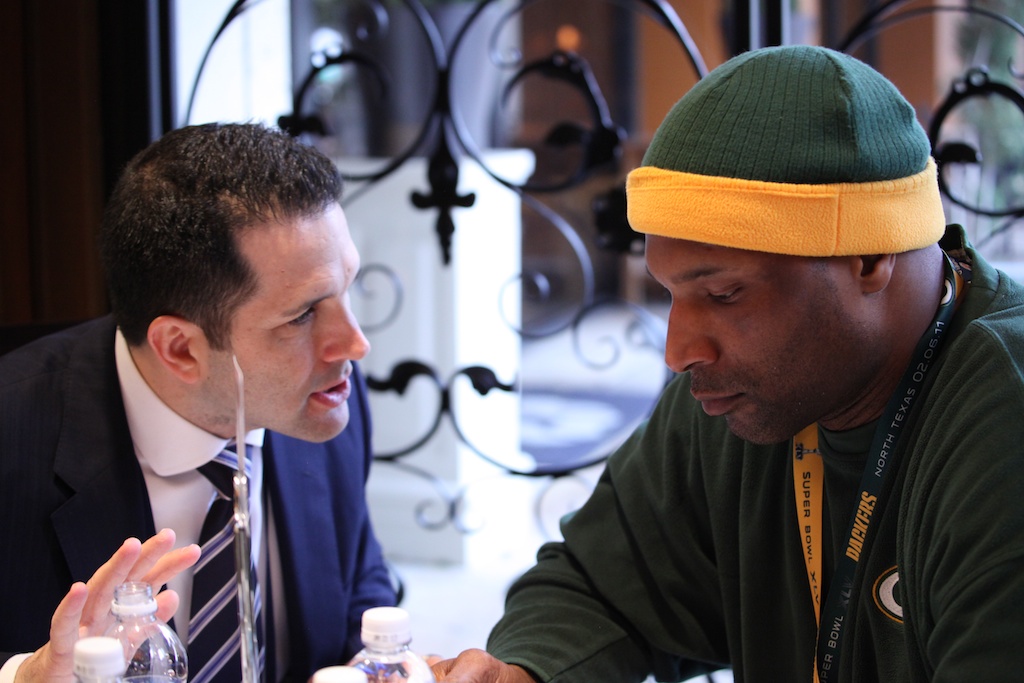- Job Seeker Resources
- |
- Last Updated: February 15, 2024

Five Tips for Developing Reliable Sources
True success in reporting, whether on TV or print, comes from the information you get from the sources you develop.
Sports reporters like Adam Schefter, Jay Glazer, Peter Gammons and David Aldredge have become the most respected voices in their sports because they bring fresh information to the audience, not just regurgitated and recirculated topics.
It took these award-winning reporters years to build their network of reliable sources, but if you are just starting out you don' t have years, the audience has expectations now!
For advice on developing reliable sources from the ground up, we turned to ESPN Play-by-Play announcer and anchor Anish Shroff. Before landing at ESPN, Shroff worked in smaller markets like KNDO-TV in Yakima, Washington, where making connections with the local sports teams was essential:
When you first started out how did you go about developing sources?
Shroff: Developing reliable sources involves building professional relationships. Here's how to start the relationship building:
- Introduce yourself to those you will be covering. Don't just send emails, call, and if you can, go in person. It takes time but it's worth the effort.
- In that initial meeting leave the notepads, cameras and tape recorders behind. Just a simple "get to know you" meeting to start.
- Discover some common ground to connect on, don't force it, but try to connect on some level.
When I began my first job reporting, I spent my first week calling every high school athletic director in the area. That way when I called them actually needing something, it wouldn't be the first time I would be speaking to them.
When they see you are a real person and not just someone out for a story, it gives you that much more credibility going forward when you're actually trying to get that story.
When a source gives you information you get a good story, what do you think they get out of it?
Shroff: Most sources are looking for favorable coverage. They may or may not say that directly. Your job is to be fair and unbiased while your ultimate goal is to serve the viewer.
You are not a public relations mouthpiece for who you cover. It's OK to like people you cover, we're dealing with people after all, but remember when disseminating information everyone has an agenda and an angle.
It's on you to see through the agenda and decide: is this credible? can I validate it the information through another source? is this fair? does it serve my audience? what happens if this isn't accurate?
So how can you tell if someone is reliable, or just using you to get a particular message out there?
Shroff: This is where your reporter instincts need to kick in. Ask yourself these questions:
- Is someone pushing their side of a story?
- Is there another side of the story?
- Why is someone pitching you this?
- What will the audience think of this story?
You owe it to yourself, your station, and your story to explore motives. If a source continues to push a story on you and wants to get a message out there, it's fair to ask them why.
You are not there to do a Public Service Announcement for another entity. It's your job to find good stories for your audience. Occasionally these lines intersect, but be careful not to be a shill.
Now that you are more established is it easier to get information from sources, or harder?

Shroff: Once you are more established it becomes much easier to develop sources and get information.
You'd be surprised how many coaches and players will share inside information. It's important to recognize the tone of these conversations. Know what's off the record and for your ears only. Don't become a gossip.
If you pick up one valuable piece of information that you want to pursue as a story, ask the subject if they'd be willing to go on the record.
I've found that being forthcoming about your intentions is one of the best ways to build credibility and trust.
Any tips you would give a new reporter on building a network of reliable sources?
Shroff: Actually I have a few tips that I've been taught over the years and I like to share:
- Be a real person. People will see right through you if you are fake and you'll never be trusted with real information.
- Treat those you cover fairly and with respect
- Developing sources takes time, maintaining those sources takes effort
- Be trustworthy, don't be a gossip
- Always protect the identities of sources when called for
But always remember: everyone usually does have an agenda. As a reporter, it's your job to find out what that is, and tell the WHOLE story.
Actionable Items from Anish Shroff on Building Reliable Sources:
- Start by building relationships face-to-face, try to find common ground with with the important people in your market.
- Leave the pen and paper behind initially, to build trust you need to start slow.
- Before writing or going to air with any sources information, you better be sure it's accurate. It's like you are approaching an intersection and the light turns yellow, if you have to think about it and the answer isn't crystal clear, you are better off to just stop.
- Treat those you cover fairly and with respect, if you don't you may get one story out of it, but your information pipeline will dry up quickly.
- Being a reporter means you need to be cynical. Always be thinking why is this person telling me this? what is their agenda?

Originally Published: May 07, 2015
Sign In or Register to access all articles and insider tips for help in your job search.
Search for Sports Jobs
RELATED JOBS
RELATED RESOURCES
Find the Right Job Faster
- Get personalized job matches sent to your inbox every day
- Connect directly with employers before your competition
- Advance your career with expert advice on interviewing, salary negotiation, and more
We value your privacy




